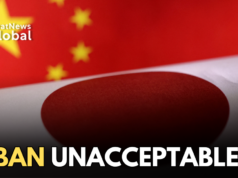The United States House of Representatives passed the Sanctions on the Chinese Communist Party’s (CCP) Tyranny and Oppression Act, also known as the Stop CCP Act, on Wednesday by a vote of 243 to 174. The legislation seeks to impose sanctions on top CCP officials responsible for violations of human rights in Hong Kong, increased aggression towards Taiwan, and the repression of Uyghur Muslims in China.
Sanctions Target CCP Leadership and Families
The Stop CCP Act, introduced by Representative Lisa McClain, focuses on holding senior members of the CCP accountable for “sanctionable conduct.” If the U.S. president determines such conduct has occurred, members of the CCP’s central committee, comprising around 360 top officials, will face restrictions. The sanctions would prohibit these officials from buying or selling property in the U.S. and revoke their entry visas.
Additionally, the act extends these sanctions to the “adult family members” and spouses of these CCP leaders, further intensifying the reach of the legislation. According to the act, “sanctionable conduct” includes actions that violate Hong Kong’s autonomy, contribute to political oppression, or result in increased aggression toward Taiwan.
Representative McClain posted on X (formerly Twitter) after the bill’s passage, stating, “As Biden & Harris stand idly by while China commits atrocities and acts of aggression, I am putting the CCP on notice. Tonight, the House passed my bill, the STOP CCP Act, to impose sanctions on Xi Jinping and CCP leaders. It’s past due for them to be held accountable.”
As Biden & Harris stand idly by while China commits atrocities and acts of aggression, I am putting the CCP on notice.
Tonight, the House passed my bill, the STOP CCP Act, to impose sanctions on Xi Jinping and CCP leaders.
It’s past due for them to be held accountable. pic.twitter.com/dD6oLqR06Q
— Representative Lisa McClain (@RepLisaMcClain) September 25, 2024
Strengthening U.S. Commitment to Taiwan and Human Rights
The act also reinforces key aspects of the Taiwan Relations Act, underscoring the U.S. commitment to resisting any force or coercion that threatens Taiwan’s security. This follows recent legislation like the Taiwan Conflict Deterrence Act, passed on September 9, which aims to restrict financial services for the families of CCP officials if Beijing attacks Taiwan.
The House Foreign Affairs Committee Majority echoed the sentiment of the Stop CCP Act in a tweet, stating, “The House just voted to PASS the STOP CCP Act, which sanctions top CCP officials responsible for threatening Hong Kong and Taiwan, or violating human rights in China. When the U.S. projects strength through action like this, the world listens.”
BREAKING 🚨 The House just voted to PASS the STOP CCP Act, which sanctions top CCP officials responsible for threatening Hong Kong and Taiwan, or violating human rights in China.
When the U.S. projects strength through action like this, the world listens.
— House Foreign Affairs Committee Majority (@HouseForeignGOP) September 25, 2024
Path Forward for the Stop CCP Act
With the bill passed by the House, it now heads to the Senate for further deliberation after their recess on November 12. If approved by the Senate, the legislation will be sent to the president for final approval. The act follows other U.S. measures aimed at limiting the influence of high-ranking Chinese officials, many of whom own significant financial assets in the U.S.
This move by the U.S. government is seen as part of a broader strategy to address China’s growing geopolitical influence and to counter its actions regarding Taiwan, Hong Kong, and human rights abuses against minorities, including the Uyghur Muslim population.
Research Associate at StratNewsGlobal, A keen observer of #China and Foreign Affairs. Writer, Weibo Trends, Analyst.
Twitter: @resham_sng





